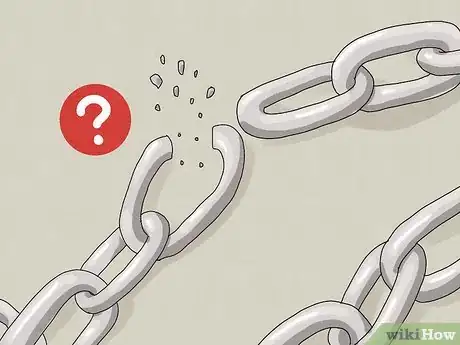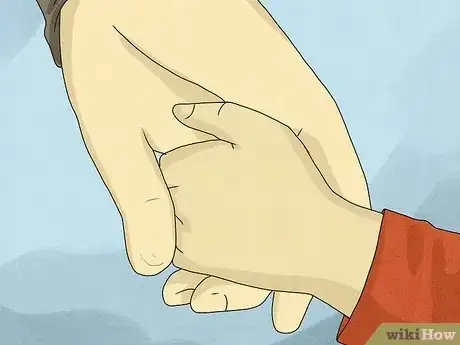This article was co-authored by Michelle Shahbazyan, MS, MA. Michelle Shahbazyan is the Founder of The LA Life Coach, a concierge life, family, and career coaching service based in Los Angeles, California. She has over 10 years of experience with life coaching, consulting, motivational speaking, and matchmaking. She has a BA in Applied Psychology and an MS in Building Construction and Technology Management from Georgia Tech University, and a MA in Psychology with an emphasis on Marriage and Family Therapy from Phillips Graduate University.
There are 10 references cited in this article, which can be found at the bottom of the page.
wikiHow marks an article as reader-approved once it receives enough positive feedback. In this case, 100% of readers who voted found the article helpful, earning it our reader-approved status.
This article has been viewed 265,964 times.
When a situation becomes too much for you to handle, you might need to detach from it emotionally. If you're going through a challenging moment in a relationship, temporary detachment can help you calm down and put your issues in perspective. Similarly, detaching during a confrontation can help you keep your cool. If you've recently broken up with someone, you may need to detach from them gradually and for good. Whatever the reason, this article will walk you through how to detach in a healthy, productive way.
Steps
Detaching from a Relationship
-
1Decide if detachment is appropriate. If you are unhappy in a relationship, ending it quickly may rob you of the possibility to get to the root of the problem. It can take months to figure out if your partnership can improve or not. In some cases, it might make sense to detach emotionally for a short period, while staying in the relationship.[1]
- For instance, you might detach if your relationship has soured due to a recent change in you and your partner's routine. You might both just need time to readjust.
- If you and your significant other are constantly at odds, or in an on-again-off-again pattern, consider detaching.
- When tensions die down, both of you can reach a better decision about whether or not the relationship should continue.
- Don't detach before you have tried seriously to fix the issues in your relationship. Detachment should only be employed if you are on the verge of breaking up.[2]
-
2Take physical space. If you and your partner do not share responsibility for a child, another dependent, a pet, a home, or business, you may have the option of taking physical time apart. Take a business trip or a vacation by yourself, or with a group of non-intimate acquaintances, such as a hiking group.Advertisement
-
3Explain to your partner that you need to focus on yourself for a while if you are asked. Don't announce your plans to detach, but if asked, say that you are thinking about the relationship and focusing on yourself for a while. You may not want to use the word "detach" or "disengage" unless that is the language you and your partner already share. Instead, say you need time to focus on a project you have, on getting right with yourself, or on work.[3]
-
4Get support from friends. It is unfair to your partner if you expect emotional support from them while simultaneously withholding your emotions from them. It will also make it hard for you to stay disengaged. Rely on your friends and family for advice and socialization. Confide in friends and family that are your own, rather than yours and your partner's.[4]
-
5Focus on getting in touch with yourself. In your time detached, focus on figuring out your feelings. What do you need to change in your relationship? What of your needs are unmet? It may help to talk to a therapist. This is a time of sorting through your own feelings, not criticizing your partner.
- Abstain from sexual contact during this time.
-
6Decide what's next. If you have realized that you want to stay in the relationship, you may have to woo your partner back. He or she may feel hurt and abandoned by your detachment. Explain that you were afraid of breaking up and that you were trying to cool off and not make a rash decision. Make an honest attempt to state your needs and listen to the needs of your partner.
- If you have decided that your relationship is over, use the perspective gained in your detachment to compassionately end your relationship.[5]
-
7Detach without neglecting shared responsibilities. If you live together, have a child, or own a pet, a home, or business, you will need to remain physically present and attentive. Detaching emotionally means holding back emotionally from the relationship for a while, but you can still share labor and everyday activities with your partner.[6]
-
8Take a break from social media. Make it hard to think about the person you are detaching from. Set the external boundary of detaching via social media. If you are on good terms with your ex but are trying to get space, you can temporarily close your account on whatever websites you both use. It can be helpful to avoid pictures of your ex, and, while you are in a wounded state, it can be helpful to spend some time away from images of other people's lives as well.
- If you are not on good terms, you can just block or unfriend him or her.
- Depending on the website, you may be able to temporarily block notifications from the person without changing your status as "friends." However, if you are worried about obsessively checking their material and getting bummed out, you should either shut down your account or drop them as "friend."
-
9Remember why it ended. Every relationship is full of the fantasy of itself. If your relationship ended, there were probably reasons all along. Once you break up, you might only remember the good parts, or what might have been. Dwell for a while instead on the conflicts, the letdowns, and the things you couldn't do then and can do now. [7]
- You don't have to vilify your partner. Just remind yourself that the two of you were not having an easy time of it and that if it hadn't ended, it might have gotten worse.
- If you are having trouble remembering what went wrong, try writing down every weak moment of your relationship. Read it over and allow yourself to grieve.[8]
-
10Practice forgiveness. After you have allowed yourself to feel the anger and pain of your breakup, choose to move on. Let go of your anger. Allow yourself to feel compassion for yourself and your ex. When you catch yourself feeling angry or resentful, name how you feel.
- Say "I resent that I always paid for our meals out" or "I am still angry that she or he never asked me what I wanted," or "I'm ashamed that I lost my temper with her instead of hearing her out."[9]
- Write a letter. You do not have to share it with your ex, but you can if you wish. Write out how you have felt and how you feel now.
- Forgiveness does not mean condoning anything that happened in the relationship. Rather, it means letting go of the anger that clouds your mood and harms your health.[10]
-
11Take care of yourself. Your focus in the months or even years after a relationship ends is learning how to live well without a partner. Once you have grieved, been angry, and worked on forgiveness, you can start working on enjoying yourself. Do things that make you feel balanced: take good care of your health, spend time with friends, do a great job at work, and enjoy outside activities.
- If you are miserable, try visiting a therapist. It doesn't have to be forever, but if your breakup has plunged you into a depression, or if you are feeling urges of self-harm, talk to a professional.
-
12Call it a transition, not a loss. It's fine to grieve for a relationship that has ended, but don't let yourself dwell forever on what might have been. Instead, think of the things you learned from falling in love, from negotiating your partnership, and from breaking up. Remind yourself that a relationship that ends isn't a bad relationship: relationships can be good and short. [11]
-
13Date when you're ready. When you're really feeling right with yourself, you'll be ready to date again. To see if you're ready, ask yourself if you're still angry at your ex, if you still want to be with your ex, if you feel unattractive, or if you are still feeling sad or unbalanced. If you aren't feeling any of these ways, you're probably ready to date. [12]
Setting Boundaries
-
1Check in on your boundaries. Boundaries are the restrictions you set to protect yourself. You have emotional, mental, physical, and sexual boundaries. They can be learned from parents as you grow up, or you can acquire them by hanging around with people who have their own set of healthy boundaries. If you are having trouble managing your time, habits, or your emotions, you may have poor boundaries.[13]
- If you feel overwhelmed by the feelings of others, or feel that your self-image comes entirely from other people, you need to attend to your boundaries.[14]
- If you often say "yes" to things you don't want to do, set boundaries.
- Pay attention to your senses. Do you have a feeling that something is wrong? Do you have an unpleasant sensation in your stomach or chest? This may indicate that a boundary wants to be asserted.
-
2Enforce your boundaries. When you know what you want, or don't want, act. Set boundaries for yourself: a daily schedule, a refusal to accept insults. Set boundaries with others: space from arguments, a refusal to give in to pressure, a refusal to let others put their emotions on you. Say "no" when asked to do something you don't want to do.[15]
- Choose with whom you discuss your life. If you have a parent, friend, or partner who is controlling, don't give them fodder by sharing information with them. Say you will only discuss a topic if you are given no advice (and no orders).
-
3Detach to communicate your intentions. When you need to establish a boundary with someone, you need to be able to communicate without worrying overmuch about their reaction. This is where emotional detachment comes in. Before you communicate, remind yourself that you are not responsible for how they feel. You have a right to set boundaries.[16]
- You can communicate boundaries verbally or non-verbally. As a simple example, when you need someone to give you space, you might stand up, look the person in the eye, and directly state, "I need some space right now."
-
4Stick to your boundaries. You may encounter initial resistance from those who are used to getting the reaction they want from you. Hold on to your convictions. Do not compromise a boundary. If you are accused of being withholding or unloving, say "I am being loving. It wouldn’t be loving of me to pretend I want something I don't."
- For example, if you set boundaries with an elderly parent you care for who is verbally abusive to you, your parent may stop that behavior once he or she sees that you will not tolerate it.
-
5Have a backup plan. Detach emotionally from the expectation that your boundaries will be respected. If you are unable to communicate boundaries to someone, or if you communicate boundaries and they are not respected, take charge of them. Set consequences for violated boundaries: say "if you call me names, I will leave the room. If you go through my phone, I will feel violated and I will tell you exactly how I feel."
- If someone in your life is abusive or unable to control his or her own anger, enact your boundaries without communication.
- Take the space you want. Leave if a confrontation is brewing.
- Put up physical barriers to things you don't want to be violated. Set a password on your computer and phone, for instance.
- If you are a caretaker for a parent who won't respect your boundaries, try hiring someone else to take care of your parent until both of you can calm down and reach a better understanding.[17]
Detaching in the Moment
-
1Recognize moments that can easily escalate. If you notice you are constantly getting in fights in a certain mood or when certain things are said, detach before you get angry. To do this, recognize the triggers and prepare for moments in which they may appear. Go back over past confrontations and isolate the things that made you angry, or made the other person angry.
- You might notice that your partner always picks a fight when she or he is stressed about work. On stressful workdays, you can prepare to detach ahead of time by reminding yourself that she or he may be in a bad mood later.
- If the issue is not between you and one person, but rather between you and one situation, recognize that situation.
- For instance, you might always start to panic in bad traffic. Recognize that this is a big stressor for you.
-
2Stay calm. When a moment escalates, or when a trigger is presented, take a moment to calm yourself down. Remind yourself what is happening, and take two deep breaths.[18] Remember that in these moments you can only control yourself, not anybody else.
-
3Return when you are calm. Take as much time as you need to step away from a confrontation. Spend some time stating how you feel. Say "I feel angry that my mother tried to tell me what to do, and I feel frustrated that when I said this she started yelling at me." Naming your emotions will give you some space from them.
- Only return when you can name how you feel without feeling a new surge of emotion.[19]
-
4Use "I statements." Say how you feel, and what you would like. Avoid the temptation to criticize or blame. You can say "I would like to hear how you feel about this, but I'm afraid we're going to have a fight. Can we take a minute, and then you can say it to me again?" Or say "I notice I'm getting really freaked out about how messy the house is. I would feel a lot better if we had a plan."[20]
-
5Exit if possible. If it feels safe to take a physical break from a situation you would like to de-escalate, go ahead and take it. A walk around the block or a little time to yourself in another room can help you calm down. On your break, focus on how you feel. Try to name it if you can. Forget your partner for a moment, and take care of your own feelings.[21]
- You can return when you are ready to re-engage. Come back calmly, knowing that your partner may still be upset.
Focusing on Yourself
-
1Recognize that you are the only person you can control. You can attempt to guide the actions and reactions of the people around you, but when all is said and done, each person has to make his or her own decisions. The only person whose behavior, thinking, and feelings are within your power to control is you.
- Just as you cannot control another human being, another human being cannot control you.
- Recognize that the only power another individual has over you is the power you give him or her.
-
2Speak in “I” statements. Get in the habit of talking about negative circumstances from the perspective of how you feel about them. Instead of saying that someone or something has made you unhappy, phrase your complaint by saying, “I feel unhappy because...” or “This makes me feel unhappy.”
- Putting things in an “I” perspective can shift your thinking, allowing you to separate yourself as an individual from the situation. This separation can actually help make you more emotionally detached from the other people involved.
- This “I” language can also help defuse a tense situation because it allows you to convey your feelings and thoughts without being accusatory.
-
3Step away. Physical detachment can trigger emotional detachment. Walk away from the person or situation causing you anxiety as soon as you can. This does not need to be a permanent separation, but the separation should last long enough for you to calm down from a state of heightened emotion.
-
4Regularly take some time for yourself. When dealing with a troubling relationship or a situation that you are unable to end, get in the habit of routinely taking the time to decompress after dealing with the source of drama. Consistently take this time for yourself even when you feel that your emotions are under control.
- For example, if you need to detach yourself from emotional stress at work, take a few minutes to meditate or unwind as soon as you get home.
- Alternatively, take a few minutes during your lunch break to do something you enjoy doing, like reading or taking a walk.
- Entering into your own private bubble, even for a few minutes, can give you the balance and steadiness you need when you return.
-
5Learn to love yourself. You are as important as anyone else. Understand that your needs are important, that your self-love is important, and that you have a responsibility to maintain your own boundaries and wellbeing. You may need to compromise with others from time to time, but you also need to make sure that you are not the only one making sacrifices.
- Part of loving yourself means taking care of your needs and goals. If you have a goal that requires you to continue your education, you may need to take the necessary steps to do so regardless of whether those around you—your significant other, your parents—agree with your decision. However, be prepared to do it alone.
- Loving yourself also means finding your own sources of happiness. You should never completely rely on any one person to make you happy.
- If you feel like your partner or another person is the only source of your happiness, recognize that you need to set better boundaries.
Expert Q&A
-
QuestionHow do you detach and still love?
 Michelle Shahbazyan, MS, MAMichelle Shahbazyan is the Founder of The LA Life Coach, a concierge life, family, and career coaching service based in Los Angeles, California. She has over 10 years of experience with life coaching, consulting, motivational speaking, and matchmaking. She has a BA in Applied Psychology and an MS in Building Construction and Technology Management from Georgia Tech University, and a MA in Psychology with an emphasis on Marriage and Family Therapy from Phillips Graduate University.
Michelle Shahbazyan, MS, MAMichelle Shahbazyan is the Founder of The LA Life Coach, a concierge life, family, and career coaching service based in Los Angeles, California. She has over 10 years of experience with life coaching, consulting, motivational speaking, and matchmaking. She has a BA in Applied Psychology and an MS in Building Construction and Technology Management from Georgia Tech University, and a MA in Psychology with an emphasis on Marriage and Family Therapy from Phillips Graduate University.
Life Coach Being emotionally detached can be a good thing. If you're always emotionally involved with everyone in your life, it can be overwhelming and exhausting. Try to focus on the positives in your life and the positive qualities in other people so you feel more emotionally stable.
Being emotionally detached can be a good thing. If you're always emotionally involved with everyone in your life, it can be overwhelming and exhausting. Try to focus on the positives in your life and the positive qualities in other people so you feel more emotionally stable. -
QuestionI've been dumped. I still desperately want it to work. I'm sure he still loves me, but in his thinking, we are on different paths and he's detached. He still has sex with me time to time. What do I do?
 John DefazoCommunity AnswerYou've been dumped. Now you're just easy convenient sex. Tell him if he loves you then he needs to step up. Set the boundaries. You're setting yourself up to get hurt if you stick around. Give him and yourself space. If he does love you, he'll tell you when he's ready. Don't assume a dying relationship is worth holding on to just because you want more.
John DefazoCommunity AnswerYou've been dumped. Now you're just easy convenient sex. Tell him if he loves you then he needs to step up. Set the boundaries. You're setting yourself up to get hurt if you stick around. Give him and yourself space. If he does love you, he'll tell you when he's ready. Don't assume a dying relationship is worth holding on to just because you want more. -
QuestionThis all sounds great but the person i am trying to get away from is in the same school as me and is in all of my classes. What can I do to get away?
 Community AnswerDetachment is about a mental state, not a physical one. Thus, even if someone who bothers you is physically near you, it's up to you to create a barrier by not engaging with them or by not letting them bother you when they're nearby. It takes practice, so no time like the present to begin; start by being polite but not overly friendly.
Community AnswerDetachment is about a mental state, not a physical one. Thus, even if someone who bothers you is physically near you, it's up to you to create a barrier by not engaging with them or by not letting them bother you when they're nearby. It takes practice, so no time like the present to begin; start by being polite but not overly friendly.
References
- ↑ https://www.psychologytoday.com/blog/insight-is-2020/201407/how-leave-relationship-emotionally-stay
- ↑ https://www.psychologytoday.com/blog/insight-is-2020/201407/how-leave-relationship-emotionally-stay
- ↑ https://www.psychologytoday.com/blog/insight-is-2020/201407/how-leave-relationship-emotionally-stay
- ↑ https://www.psychologytoday.com/blog/insight-is-2020/201407/how-leave-relationship-emotionally-stay
- ↑ https://www.psychologytoday.com/blog/insight-is-2020/201407/how-leave-relationship-emotionally-stay
- ↑ https://www.psychologytoday.com/blog/insight-is-2020/201407/how-leave-relationship-emotionally-stay
- ↑ https://www.psychologytoday.com/blog/living-forward/201508/5-ways-move-ex-you-still-love
- ↑ https://www.psychologytoday.com/blog/living-forward/201508/5-ways-move-ex-you-still-love
- ↑ http://ggia.berkeley.edu/practice/eight_essentials_when_forgiving#data-tab-how
- ↑ http://www.mayoclinic.org/healthy-lifestyle/adult-health/in-depth/forgiveness/art-20047692?pg=1
- ↑ https://www.psychologytoday.com/blog/living-forward/201508/5-ways-move-ex-you-still-love
- ↑ http://www.huffingtonpost.com/carole-brody-fleet/dating-over-50-10-ways-to-tell-if-you-are-ready_b_2961264.html
- ↑ http://psychcentral.com/lib/what-are-personal-boundaries-how-do-i-get-some/
- ↑ http://psychcentral.com/lib/what-are-personal-boundaries-how-do-i-get-some/
- ↑ http://psychcentral.com/lib/what-are-personal-boundaries-how-do-i-get-some/
- ↑ http://psychcentral.com/lib/what-are-personal-boundaries-how-do-i-get-some/
- ↑ http://www.agingcare.com/Articles/setting-boundaries-with-parents-who-are-abusive-142804.htm
- ↑ http://www.mayoclinic.org/healthy-lifestyle/adult-health/in-depth/anger-management/art-20045434
- ↑ http://mayoclinichealthsystem.org/hometown-health/speaking-of-health/feeding-your-feelings
- ↑ http://www.mayoclinic.org/healthy-lifestyle/adult-health/in-depth/anger-management/art-20045434
- ↑ http://www.huffingtonpost.com/margaret-paul-phd/love-and-relationships_b_4309353.html
About This Article
If you're going through a rough patch in your relationship, you may need some time to detach yourself emotionally from your partner. You can get some time away from your partner by telling them you need to focus on yourself for a while. Avoid actually using the word “detach” or “disengage” unless that’s part of the language you both already use. Instead, say you need time to focus on a project or on work. While separated, rely on friends and family for emotional support so you can stay completely disengaged from your partner. Use this time away from them to get in touch with yourself by focusing on your feelings. Additionally, ask yourself what you need to change in your relationship and if there are any needs you have that aren't being met. For more advice, like how to permanently detach from a relationship, read on.


























-Step-5.webp)































































